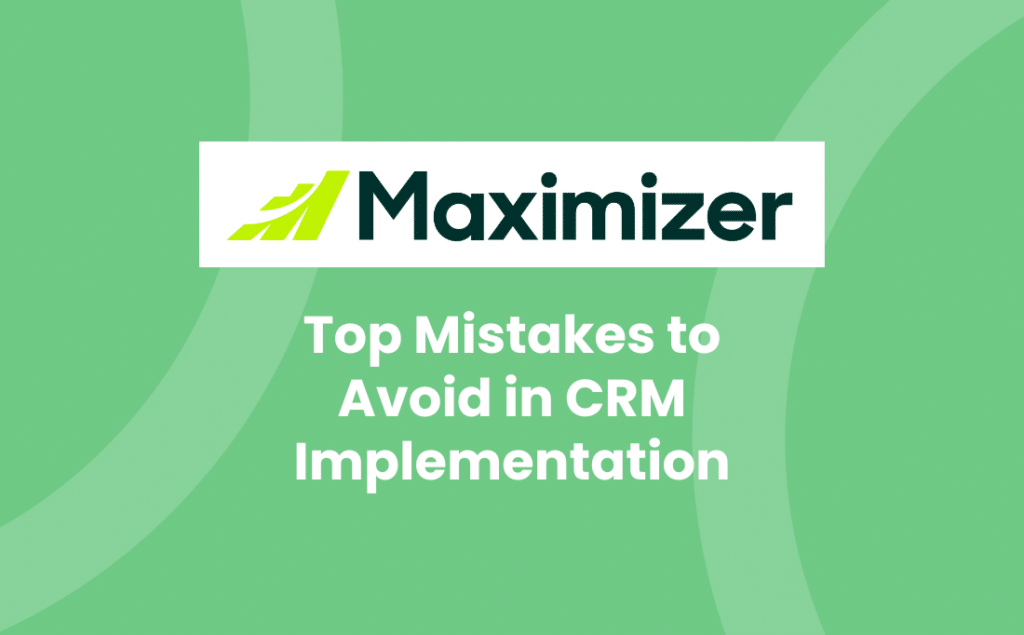Implementing a Customer Relationship Management (CRM) system can revolutionise how you manage customer interactions and data. But diving in without proper planning can lead to costly mistakes that undermine your efforts. Understanding these common pitfalls is crucial for a smooth and successful CRM integration.
From overlooking user training to underestimating data quality issues, many businesses stumble at the same hurdles. By anticipating these errors before they occur, you can ensure your CRM system delivers maximum value and efficiency. Let’s explore the top mistakes to avoid when implementing CRM, so you can sidestep these challenges and set your business up for success.
Key Takeaways
- Define Clear Objectives: Set specific goals for your CRM implementation to ensure the project has direction and meets business needs.
- Invest in Staff Training: Provide comprehensive training and continuous support to ensure employees can effectively use the CRM system and understand it’s importance.
- Ensure Data Quality: Cleanse data before migration and implement regular quality checks to maintain reliable information.
- Focus on User Adoption: Engage users early, communicate benefits clearly, and address resistance through continuous feedback loops.
- Assess Technical Compatibility: Ensure the CRM system integrates well with existing software to prevent workflow disruptions and data silos.
Understanding CRM Implementation
Implementing a Customer Relationship Management (CRM) system like Maximizer can transform your manufacturing business by enhancing customer interactions and streamlining data management. But, to achieve these benefits, understanding the key aspects of CRM implementation is crucial.
The Significance of Strategy
Strategy ensures that your CRM implementation aligns with your business objectives. Without a clear strategy, you run the risk deploying features that don’t support your goals. Identify your specific needs before selecting modules and functionalities. For instance, if improving customer service is a priority, focus on tools that enhance communication channels.
Effective strategy also involves setting measurable goals. Determine key performance indicators (KPIs), such as customer retention rates and sales cycle duration, to track success. Also, engage stakeholders from various departments to ensure the strategy meets the needs of different teams within the business.
The Role of Technical Compatibility
Technical compatibility between Maximizer CRM and your existing systems is essential for seamless integration. Incompatibility can lead to data silos and workflow disruptions. Evaluate your current IT infrastructure before implementing the CRM solution.
Ensure that Maximizer integrates well with other software used in your manufacturing processes, such as Enterprise Resource Planning (ERP) systems. This integration facilitates real-time data sharing across platforms, enhancing operational efficiency.
Consult with IT professionals or Avrion’s digital transformation services to assess compatibility issues early on. Address potential challenges like differing data formats or outdated hardware to prevent implementation delays.
By focusing on strategic alignment and technical compatibility, you can avoid common pitfalls in CRM implementation and leverage Maximizer’s full potential for your manufacturing business’s growth.
Top Misconceptions to Avoid in CRM Implementation
When integrating Maximizer CRM into your manufacturing operations, you can avoid common pitfalls by understanding and addressing key mistakes.
Lacking a Clear Objective
Defining a clear objective is essential for successful CRM implementation. Set specific goals, like improving customer satisfaction or increasing sales efficiency, to guide your efforts. Without a defined purpose, your CRM project may lack direction and fail to deliver the expected benefits.
Inadequate Staff Training and Support
Training staff ensures they can effectively use the new system. Provide comprehensive training sessions tailored to different teams and roles within your organisation. Continuous support is crucial; employees should have access to resources and assistance as they adapt to Maximizer CRM.
Ignoring Data Quality and Migration
High-quality data forms the backbone of any CRM system. Before migrating data to Maximizer, cleanse existing data to remove inaccuracies and duplicates. Implementing regular data quality checks post-migration helps maintain reliable information for decision-making.
Underestimating User Adoption Challenges
User adoption is critical for CRM success. Engage users early in the process by involving them in planning and providing clear communication about benefits. Address resistance through continuous feedback loops, ensuring the system meets user needs effectively.
For more insights on digital transformation services related to Maximizer CRM, explore Avrion’s solutions.
Impact of Common CRM Implementation Errors
Ineffective CRM implementation can lead to significant setbacks. These errors affect both customer relations and employee performance, diminishing the benefits of Maximizer CRM for manufacturing growth.
Effects on Customer Relations
Customer dissatisfaction increases when data inaccuracies persist due to poor migration practices. Accurate, timely information is vital for maintaining strong customer relationships. Delayed responses and inconsistent communication occur if your team lacks proper training on Maximizer CRM functionalities, reducing customer trust. Overcomplicated processes frustrate customers, emphasising the need for a streamlined user experience.
Impact on Employee Performance
Employee productivity declines when inadequate training hampers their ability to use Maximizer CRM efficiently. Confusion arises without clear objectives, leading to inconsistent usage across teams. High-quality data is essential; neglecting data integrity results in unreliable insights that hinder decision-making. Low user adoption stems from a lack of support and engagement, eventually affecting overall business performance.
Visit Avrion’s Digital Transformation Services to learn how to optimise your Maximizer CRM implementation and avoid these common pitfalls.
Strategic Recommendations for Successful CRM Implementation
To ensure a successful CRM implementation, focus on continuous improvement and customisation. These strategies help you maximise the benefits of Maximizer CRM in the manufacturing sector.
Continual Assessment and Feedback
Regularly evaluating your CRM system is essential. Gather feedback from users to identify pain points and areas for enhancement. Use surveys, interviews, and usage data to collect insights. Carry out changes based on this feedback to keep the system aligned with user needs and business goals.
Engage all stakeholders in this process. Include sales teams, customer service reps, and IT staff to provide comprehensive perspectives. This collaborative approach ensures that Maximizer CRM evolves with your organisation’s requirements.
Emphasising Customisation and Flexibility
Customise your CRM to fit your specific manufacturing processes. Tailor fields, workflows, and dashboards in Maximizer CRM to match your operational needs. This flexibility allows you to address unique challenges within the manufacturing industry.
Make the most of Avrion’s Digital Transformation Services for expert guidance on customising Maximizer CRM. Leverage their experience to develop a system that supports efficient production management and customer engagement.
By focusing on these strategic recommendations, you can optimise your CRM implementation for sustained growth in the manufacturing sector.
Conclusion
Maximising the potential of your CRM system requires careful planning and execution. Avoiding common mistakes in CRM implementation will ensure your manufacturing business reaps the full benefits of Maximizer CRM. Focus on continuous improvement, customisation, and engaging stakeholders to tailor the system to your unique processes.
Use expert guidance, like Avrion’s Digital Transformation Services, to navigate complex challenges. By prioritising strategy alignment, data quality, and user training you’ll foster stronger customer relations and enhance employee performance. Taking these steps will set you on a path towards sustained growth in the manufacturing sector.
Frequently Asked Questions
What is the importance of user training in CRM implementation?
User training ensures that employees understand how to use the CRM system effectively, maximising its benefits. Proper training leads to better data entry, improved customer interactions, and enhanced productivity.
How does data quality impact CRM success?
High-quality data is crucial for accurate reporting and decision-making. Poor data quality can lead to incorrect insights, ineffective strategies, and ultimately hinder the growth potential of a manufacturing business.
Why should a CRM strategy align with business goals?
Aligning your CRM strategy with business goals ensures that the system supports overall objectives. This alignment helps in improving customer relationships, increasing sales, and achieving long-term growth.
What are common mistakes to avoid during CRM implementation?
Common mistakes include lack of user training, poor data quality management, not aligning CRM with business strategy, and ignoring technical compatibility. Avoiding these errors ensures a smoother implementation process.
How can Maximizer CRM benefit manufacturing growth?
Maximizer CRM offers features tailored for manufacturing businesses, such as sales tracking. It helps streamline processes, improve customer relationships, and boost overall efficiency.
What are the consequences of poor CRM implementation?
Poor implementation can lead to decreased employee performance, strained customer relations, and failure to achieve desired outcomes from the CRM system. This negatively impacts business growth and efficiency.
Why is continuous improvement vital for successful CRM use?
Continuous improvement allows businesses to adapt their CRM systems based on evolving needs and feedback. This ensures that the system remains effective and continues to provide value over time.
How can customisation enhance CRM effectiveness in manufacturing?
Customisation allows the CRM system to fit specific manufacturing processes and workflows. This improves usability for employees and ensures that the system meets specific business requirements.
What role do stakeholders play in successful CRM implementation?
Engaging stakeholders ensures that their needs and insights are considered during implementation. Their involvement increases buy-in, leading to higher adoption rates and better utilisation of the system. Without their engagement the CRM system would fail.
How can Avrion’s Digital Transformation Services aid in CRM implementation?
Avrion’s Digital Transformation Services provide expert guidance throughout the entire process. Their expertise helps avoid common pitfalls, ensuring a seamless transition and optimised use of Maximizer CRM for sustained growth in manufacturing.


